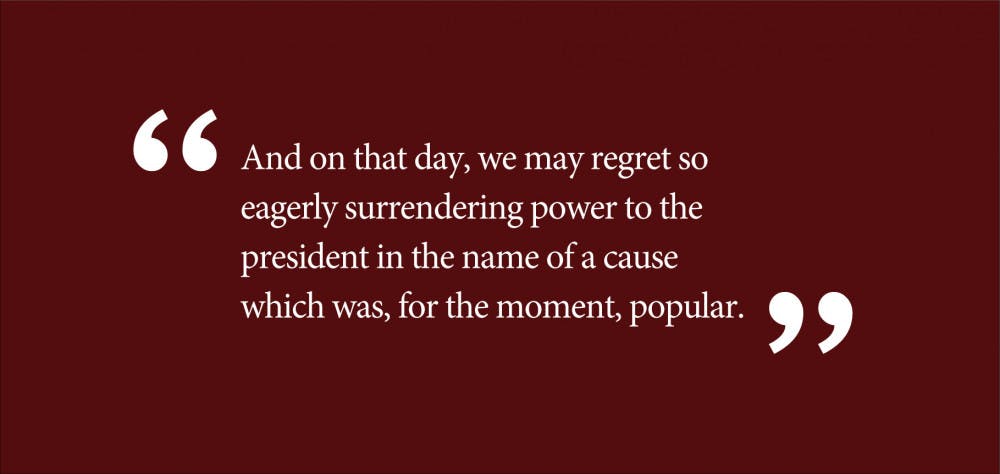Last week, after a number of high-profile stories of teens hospitalized with lung illnesses related to vaping, President Trump announced his intention to direct the Food and Drug Administration to ban most flavored e-cigarettes.
While tobacco flavored e-cigs encourage cigarette smokers to quit by switching to the arguably less unhealthy e-cigarette alternative, the more flavorful — including chocolate, strawberry and even root beer float — attract young people who otherwise would not partake in vaping. For that reason, Trump’s announcement received bipartisan praise from lawmakers; in fact, some Senators even called for stricter regulations. And, to my mind, it’s probably a smart move. Even after barring the negative effects of the additives in e-cigarettes, the adverse effects of nicotine — such as an increased risk of heart disease — are well known. So, it’s desirable to prevent teenagers from wanting to vape in the first place.
But my complaint isn’t with what Trump did, it’s how he did it — and what it says about the power of the executive altogether.
Rather than plea to Congress to ban these products, Trump directed the FDA to issue a rule effectively outlawing their sale, at least for the time being. The idea that any president, love or hate them, possesses the authority to unilaterally ban a commonly produced and purchased consumer good should frighten everyone. Today it may be an issue upon which most people agree, but someday we may not be so lucky. And on that day, we may regret so eagerly surrendering power to the president in the name of a cause which was, for the moment, popular.
The problem is, Congress has given executive departments like the FDA free reign to regulate items within their purview. Over the years, pieces of legislation have given the FDA the power to regulate everything from food and drugs, tobacco products and cell phones and lasers. The power to regulate means that the FDA can, in many cases, constrain and severely damage industries with onerous rules. In some cases, as it appears in this case, the FDA can ban specific products outright. In the case of e-cigarettes, the FDA has the authority to regulate their contents, and now plans to use that power to ban the entire category of flavored e-cigarettes.
Issues of this sort rarely garner more than a few column inches, largely because the rules coming out of the FDA and agencies like it tend to be more modest and more targeted. But this rule, similar to the rule last year banning bump stocks on firearms by the Bureau of Alcohol, Tobacco, Firearms and Explosives, came not from the careful consideration of the regulatory agency itself, but from a president far more concerned with public reaction than constitutionally prescribed legislative processes. Regardless of the wisdom of these rules themselves, it shouldn’t be possible for a president to use the power Congress has entrusted to regulatory agencies to change policy on a whim for the entire country.
The problem isn’t so much that the president overstepped the bounds of his office, it’s that the boundaries are far too wide. It seems perfectly reasonable to think that since Congress gave the executive branch the authority to regulate the content of tobacco products, the FDA therefore has the power to “clear the market of flavored e-cigarettes.” And in this era of hyperpartisanship and legislative gridlock, it seems doubly reasonable to think that giving the executive more power may be the only way to actually get things done.
But this is far too much power for one person. A ban on flavored e-cigarettes could shutter, or at least severely impact thousands of businesses across the country. It may be that it’s worth the economic hit to prevent further generations from becoming addicted to nicotine, but for a person to single-handedly implement such a policy is far from good process.
Andrew Reed ’21 can be reached at andrew_reed@brown.edu. Please send responses to this opinion to letters@browndailyherald.com and op-eds to opinions@browndailyherald.com.





